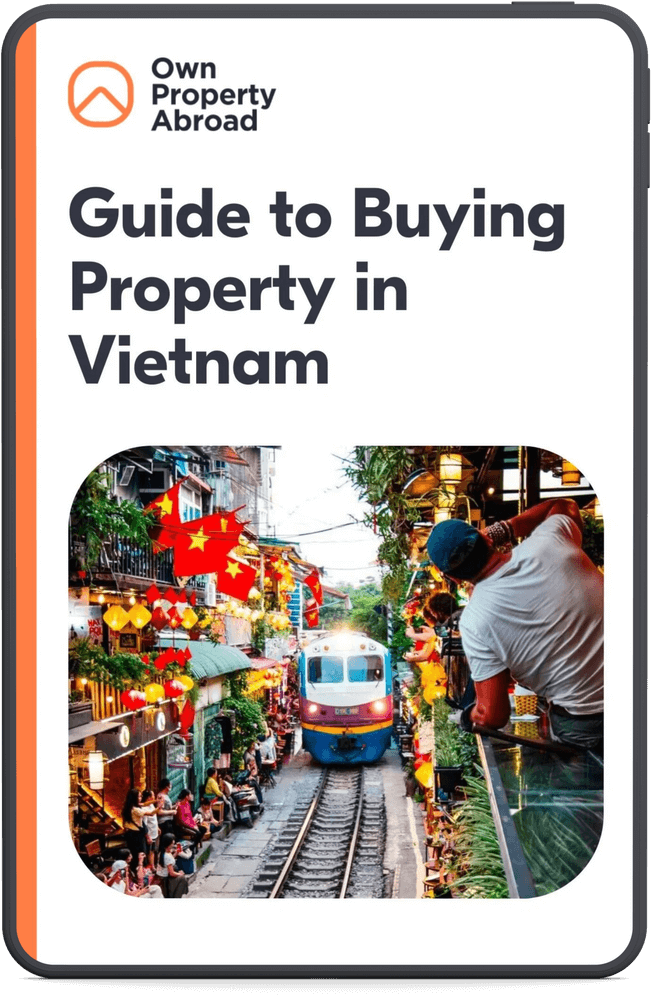Legal requirements regarding the sale of property
Understanding and complying with the legal requirements is key for foreigners looking to sell a house in Vietnam. Here are the legal requirements regarding the sale of property in Vietnam:
- Valid passport: Ensure your passport is current when selling property in Vietnam. If it has expired, renew it but keep the old one. Old and new passports must be presented to the notary for resale.
- Property ownership papers: While the “pink book” is the standard way to prove property ownership, most foreigners will have Sales and Purchase Agreements when selling property in Vietnam. These agreements are accepted as valid proof of ownership in place of the “pink book” for foreigners engaging in property transactions.
- Tax code: As a foreigner, you must obtain a tax code from the local tax office. The tax code is essential to legally execute the property transfer and conform to Vietnamese tax policies. It is also a unique identifier for your financial obligations within the country.
Valuable insights and practical advice, distilled from years of expertise and real-world experience.


6 steps on how to sell property in Vietnam for foreigners
Selling residential real estate in Vietnam might be difficult for foreigners. However, they can successfully execute the sale with guidance and understanding local regulations. Below are six steps on how to sell property in Vietnam.
Step 1: Obtain the necessary ownership documentation
Having the Certificate of Land Use Rights and Ownership of Houses and Assets on Land is crucial, commonly known as the “pink book.” This certificate is the proof of your legal ownership when selling property in Vietnam. However, foreigners often hold Sales and Purchase agreements instead of a pink book, which is also acceptable for the sales process.
Step 2: Engage with a professional
Given the complexities of real estate transactions in a foreign country, it is wise to seek assistance from professionals who are well-versed in the local market and regulations. Hiring a reputable real estate agent or a lawyer can provide you with the necessary guidance and support throughout the selling process.
Step 3: Negotiate sale terms
Once you find a prospective buyer for your property, the next step is negotiating and agreeing on the sale terms. To avoid misunderstandings when selling property in Vietnam, it is crucial to draft a comprehensive sales and purchase agreement detailing the agreed conditions, price, and payment method.
Step 4: Transfer property ownership
Following the agreement to sell a house in Vietnam, you must transfer the property ownership rights to the buyer. This is done at the local notary office. Here, the ownership transfer is officially updated, and you can collect the payment for the property. This step is critical in legally transferring the ownership to the buyer.
Step 5: Submit transfer confirmation to the developer
After notarization, you must return the transfer confirmation to the property developer. This process is essential for the developer to update their records and officially register the new owner’s name against the property.
Step 6: Pay the transfer tax
When selling property in Vietnam, the final step is to visit the tax department with the necessary documents to pay the transfer tax. This is essential as it facilitates the legal movement of the resale proceeds out of Vietnam.
Taxes to pay on real estate sales in Vietnam
Real estate transactions come with various taxes and fees when selling a property. Knowing the costs when selling property in Vietnam is essential to navigating the process smoothly and avoiding surprises. Here are the taxes to pay on real estate sales in Vietnam:
- Value Added Tax (VAT): A tax of 10% levied on the real estate sale price, typically paid by the buyer.
- Registration fee: A fee of 0.5% of the property value when selling property in Vietnam, usually shared between buyer and seller.
- Notary fees: When selling property in Vietnam, the notary handling the transaction is charged a fee ranging from 0.05% to 0.1% of the property’s value.
- Property tax: A local tax collected yearly, varying from 0.03% to 0.15% of the property’s assessed value.
- Capital Gains Tax (CGT): A 20% tax on the profit from the sale, calculated from the difference between purchase and selling prices.
- Personal income tax: A tax of 2% on the selling price of the property, which the seller typically pays.
- Real estate agent commission: A fee typically around 2% of the selling price, paid for the agent’s services during the sale.
- Pink book fee: A 0.5% tax to update the new owner’s name on this book, typically paid by the buyer.
Valuable insights and practical advice, distilled from years of expertise and real-world experience.


Frequently Asked Questions (FAQs)
How do I transfer property in Vietnam?
To transfer property in Vietnam, you must follow legal procedures, including obtaining necessary documentation, such as a land use certificate, and registering the transfer with the local land registry office.
Can foreigners sell a condo in Vietnam?
Foreigners can sell a condo in Vietnam, but they must hold the property for a minimum duration, usually one year from the date of property handover, before selling it.
How much tax do I pay when selling my house in Vietnam?
When selling a house in Vietnam, the taxes are a registration fee of 0.5% of the property value, notary fees of 0.05% to 0.1%, a 20% Capital Gains Tax, and a 2% personal income tax on the sale price.
Is this the right time to sell my Vietnamese property?
Yes, it is the right time to sell your Vietnamese property. House prices have been rising, with a 6 percent year-on-year increase and double-digit increases in downtown areas.



